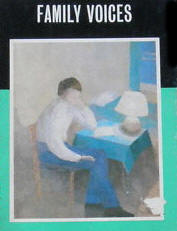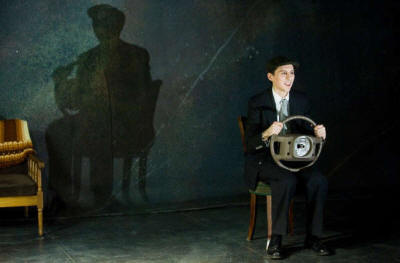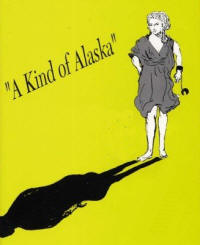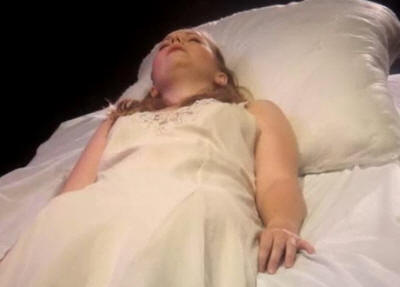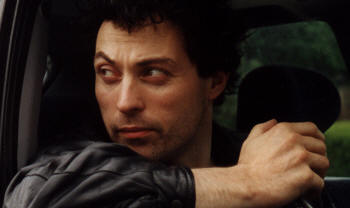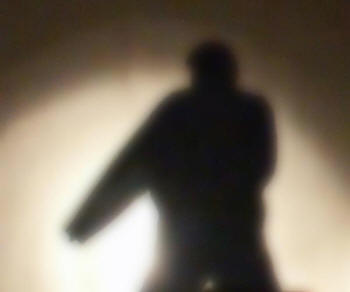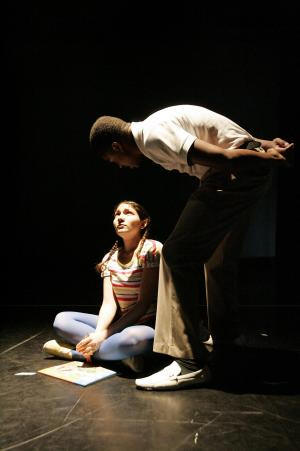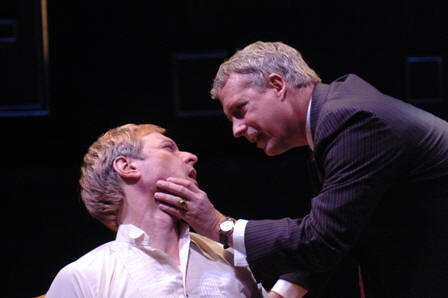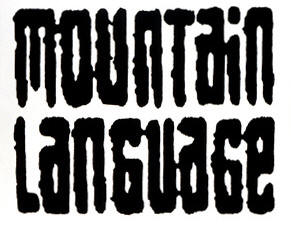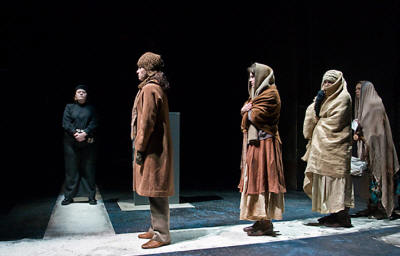| pinter plays: hearing voices | ||||||||||||||||
|
pinter home plays 1950s 1960s 1970s 1980s 1990s shorts discussion news |
||||||||||||||||
|
Family Voices when I said I was drunk I was of course making a joke do you ever think of me / your mother/ ever/ at all at night I hear whispering from the other rooms and do not understand it something has happened A son and his mother, who
have lost contact with each other, write letters. "I'll never
forget seeing Peggy Ashcroft as a distraught mother and Michael Kitchen
as her wayward son at the National in a platform performance of Pinter's
Family Voices, a radio play that more than merited its jump to the
stage" (Benedict Nightingale in The Times, 7 Jul 2008
here). The play was written for BBC Radio 3 and was broadcast on 22 Jan 1982 with Michael Kitchen (Voice 1), Peggy Ashcroft (Voice 2) and Mark Dihnam (Voice 3). The director was Peter Hall. The same people presented a platform performance in the National Theatre, London on 13 Feb 1981 where it was then staged as part of Other Places on 14 Oct 1982 (from Plays 4). The photo is Stephen Pilkington in the Bernstein Theatre at Shakespeare and Co. production in 2009. Click on the image for the source.
A Kind of Alaska
no-one hears what I say / no-one is listening to me something is happening did they sacrifice me to you what was I doing if I wasn't dead I keep telling her I'm not prepared to tolerate here risible, her tendentious, her eclectric, her ornate, her rococo insinuations and garbled inventions the most crushing spaces/ the most punishing spaces I have never let you go I think I have the matter in proportion A play for three actors, part of the Other Voices trilogy of plays.
From Must You Go? by Antonia Fraser. Views differ on the play: "Not a word is wasted in this extraordinary story, inspired by Oliver Sacks' Awakenings, a woman emerging from 29 years of sleeping sickness. What moves one is the sense that Pinter's heroine, Deborah, is returning from a strange no-man's-land between life and death, and that her plight is matched by that of her sister and brother-in-law who have patiently tended her. I have never known the piece fail in performance." (Michael Billington in Guardian 31 Mar 2006 here). "The writing in “Alaska” is not Mr. Pinter’s most delicate" (Ben Brantley in New York Times, 22 Nov 2010 here).
The play premiered in The National Theatre on 14 Oct 1982 with Judi Dench as Deborah, Paul Rogers as Hornby and Anna Massey as Pauline (from Samuel French edition of A Kind of Alaska). You can watch part of the play here. The drawing is based on the
cover of A Kind of Alaska by Ann C. Hall.
I'm just talking into this machine, trying to make some sense out of our lives / that's my function / God gave me this job / he asked me personally you've got a little daughter / yes, I think that's what she is you're beginning to obsess me A short 10 minute play with a taxi controller in his office and a taxi driver in his car communicating by radio. A simple request to pick up a passenger from Victoria Station brings out the inability of the two to communicate. The driver claims he is beside Crystal Palace and can see it, "It's a wonderful edifice", but the palace no longer exists. The controller says it burnt down in the Great Fire of London (1666) but the palace was built in 1851 and was destroyed in 1936. "Victoria Station... probably echoes his Comedies of Menace to an extent in that it’s a comedy about two characters who are almost lost in time and space. The whole conversation between the radio controller and the taxi driver is conducted over the airwaves and you might think it’s a piece for radio, but it has this stillness about it on stage, and though they’re close to each other on the stage, they’re poles apart." (Paul Osborne quoted in The Press 11 Feb 2011 source here). Antonia Fraser 3writes
"Harold read me his new sketch Victoria Station... It's based on
something that happened to him in a minicab going to see his parents,
and drove him to a frenzy" (from Must You Go?).
The play premiered at the National Theatre in London on 14 Oct 1982. The director was Peter Hall and the actors were Paul Rogers (Controller) and Martin Jarvis (Driver). It was part of the Other Places triple bill (from Plays 4). Bizarrely the Lizard Factory company decided to perform the play dressed as snorkellers (from Philip Fisher's review here). You can watch a Dutch version of part of the play (with subtitles) here The Victoria Station logo is from the Dutch Vimeo film directed by DjoxFutura. The first photo is from the Alcove Entertainment film directed by Douglas Hodge with Robert Glenister and Rufus Sewell. The second photo is of Robert Allwood in Edinburgh (click on the images for the sources).
these people are actively and wilfully deceiving the public I want to see the colour of their entrails / same colour as the Red Flag, old boy More a sketch than a play, this 400 word piece is for two actors. Typically for Pinter the characters talk while drinking, and while subject is not totally explained until the end of the play, the shock denouement is not particularly surprising. "After Other Places, Pinter told Mel Gussow that he ‘felt obliged to explore other territory’ (Gussow 149): the world of national/international public events; and at this stage he still thought this was inimical to dramatic experience. But, with Precisely, Pinter started to explore the ‘other territory’ and discover a new voice for himself and his theatre" (Dilek Inan, Public Consciousness Beyond Theatrical Space: Harold Pinter Interrogates Borders and Boundaries here). Billington (page 323) says "in particular, his despair over the growing gulf between the rhetoric and the euphemisms of political discourse and brutal reality. It is the theme that lies behind Precisely, One for the Road and Mountain Language and that makes them, for all their brevity, not just marginal footnotes to his dramatic oeuvre, but important extensions of it". The play premiered at the
Apollo Theatre in London on 18 Dec 1983. Pinter directed and the actors were
Barry Foster (Stephen) and Martin Jarvis (Roger).
It was part of The Big One bill (from Plays 4).
One for the Road 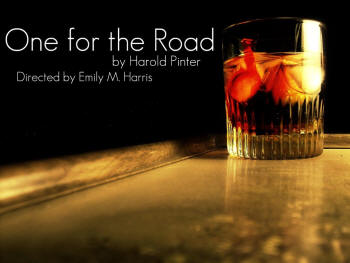 you're a civilised man / so am I God speaks through me one has to be so scrupulous about language do you love the death of others as much as I do I hate despair / I find it intolerable your soul shines out of your eyes A short 45 minute play for four actors playing Nicolas an interrogator, and Victor, Gila and Nicky, the husband, wife and their child. Pinter says of the play "... it describes a state of affairs in which there are victims of torture. You have the torturer, you have the victims. And you can see that two of the victims have been physically tortured". Pinter says he was inspired by an incident in Turkey where some people were imprisoned for being members of the Turkish Peace Association. He talked to two Turkish girls who dismissed the imprisonment and when asked about torture shrugged it off with "Oh, you're a man of such imagination". Pinter "out of rage started to write One for the Road". Antonia Fraser says he wrote it overnight (Jeff James in Exeunt, 5 Sept 2011 source here). The Pinter quotes are from a 1985 conversation between Pinter and Nicholas Hern, printed as the introduction in the Methuen edition of the play.
From Must You Go? by Antonia Fraser. The interrogator talks individually to each person in turn, the words giving an indication of the torture each has gone through. Victor pleads "kill me". One of the three will not survive. Billington says Nicholas "seems less secure than his victims and craves validation for his actions" (page 294). He also points out the power of the change of tense in the last sentence of the play (page 236). The premiere was in the Lyric Theatre Studio, Hammersmith, London on 13 Mar 1984 along with Victoria Station. Pinter directed Alan Bates (Nicolas), Roger Lloyd Pack (Victor), Jenny Quayle (Gila) and Stephen Kenmber and Felix Yates (alternating as Nicky). The play later became part of the Other Places triple bill. Pinter briefly considered a sequel in which the husband and wife, at liberty, meet the torturer (from Must You Go? 25 Nov 2001)- the ideas resulted in Celebration. You can read the play here. The poster is from the San
Antonio's Attic Rep production directed by Emily M Harris. The first
photo is from a production by students of the College of Haringey, Enfield
and North East London directed by Daniel Nicholson-Porter. The second
photo features Nigel Reed and Richard Pilcher from the Middlebury College
site (click on the images for the sources). |
||||||||||||||||
|
|
||||||||||||||||
|
Mountain Language
who did this / a big dog / what was his name / before they bite they state their name your language is dead / it is forbiden we are out on a lake / it is spring/ I hold you I warm you |
||||||||||||||||
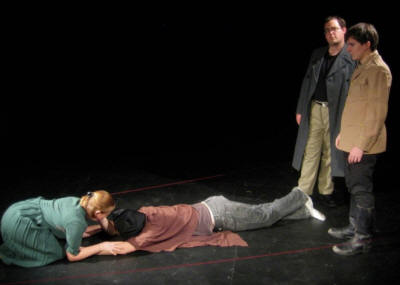 |
||||||||||||||||
|
A short 20 minute political
play for eight actors. The government of an unnamed state have banned
one of the languages, the mountain language. An elderly woman visits a
prisoner but she only knows the mountain language so cannot talk to him.
Four acts and very powerful.
From Must You Go? by Antonia Fraser.
"Written with the economy and eloquence of poetry,
Mountain Language The play later came close to reality: "Police smashed down the doors of a community centre in Harringay, north London, after reports that armed men in combat gear were pointing guns at people sitting on the floor. As a police helicopter circled overhead, the refugees were ordered outside, handcuffed and forbidden to speak in Kurdish while they sat in a police van... But it later emerged that the group had been performing Harold Pinter's Mountain Language..." (from BBC News 2 Feb 2000) The play premiered in The National Theatre in London on 20 Oct 1988 The cast included Mirand Richardson and Pinter directed (Plays 4). You can watch part of the play here.
|
||||||||||||||||
